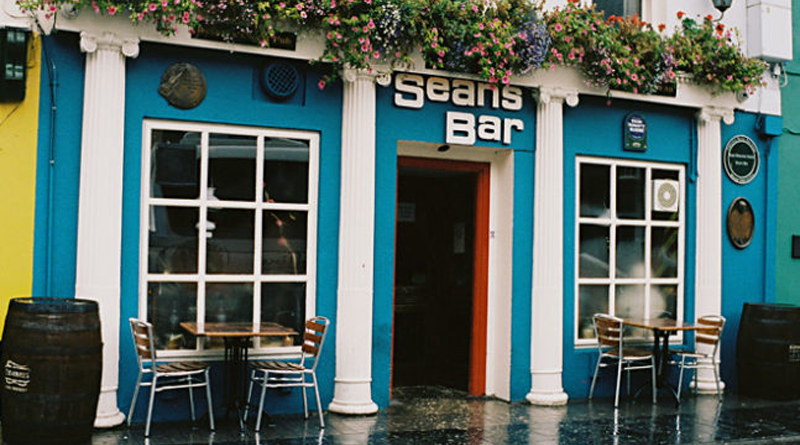The Oldest Pub in the world
Shortly after the working day begins, a hush falls over the streets of Athlone in Ireland’s County Westmeath. Away from the banks, hotels and shopping centres, buses empty out, commuters dip from sight and moored barges and skiffs on the River Shannon are at standstill as the dark, silted water flows past.
But across the town’s arched stone bridge, in an unassuming building on the river’s west bank, a 50-year-old barman named Timmy Donovan is already pulling his first pint of the day at Sean’s Bar – and a buzz is starting to build.
When the pub closes after midnight, the pitted fireplace will have crackled since mid-morning, and scores of pints of creamy-headed stout – and as many drams of whiskey and cups of Irish coffee – will have been poured. Just as barkeepers at the dimly lit pub have done with more rudimentary forms of alcohol such as mead for the past 1,100 years.
Sean’s Bar in Athlone, Ireland, has been serving drinks for the past 1,100 years (Credit: Mike MacEacheran)
Sean’s Bar, with its woodchip-covered floor and walls made of wattle and wicker interwoven with horse hair and clay, has been in business since the Dark Ages. Located near to the ruins of a 12th-Century Norman Castle, it is the oldest extant public house in Ireland, a claim officially certified by Guinness World Records in 2004. But many, including the current owners and plenty of Athlone regulars and respected Irish historians, also believe it to be the oldest in the world.
“Just imagine how much history this place has seen,” Donovan said, gazing out across the low-ceilinged bar beyond the morning’s first trickle of customers. “I’ve been researching our history for 30-odd years and no other pub comes close.”
When you walk in, you can feel the history and the romance straight away
Europe’s other most storied pubs – Leeds’ The Bingley Arms (953), Abergavenny’s The Skirrid Mountain Inn (1110), Nottingham’s Ye Olde Trip to Jerusalem (circa 1189) and Dublin’s Brazen Head(1198) – all have claims on the title of the world’s oldest continuously run pub. Others, too, maintain historical, if hazy, back stories as murky as any pint of Guinness.
But according to archaeological research conducted and verified by the National Museum of Ireland, Sean’s Bar dates further back than them all: to 900AD. This predates the defeat and decline of the Vikings in Ireland. The Anglo-Norman conquest of Ireland. And the creation of whiskey and black beer themselves, with which the Emerald Isle’s pubs have become synonymous. Combined with the carbon-dated material – including bits of mud, wood and wattle – and the presence of ‘tavern tokens’ found on the site (now on display in the National Museum of Ireland), the sense in Ireland is that Sean’s Bar is very much worthy of the legend.
“When you walk in, you can feel the history and the romance straight away,” bar manager Declan Delaney said, pulling pints of stout for another group of thirsty arrivals. “This is the genuine article. There has been many owners and short-term tenants over the years, but the principals remain the same. It’s got to have ‘caint, ceol, agus craic’ – chat, music and craic. That’s what makes it authentic.”
Sean’s Bar is officially recognised by Guinness World Records as the oldest extant public house in Ireland (Credit: Mike MacEacheran)
In his classic novel Ulysses, Irish author James Joyce wrote that a ‘good puzzle would be to cross Dublin without finding a pub’, and today his homeland’s geography is the equal to this conundrum. Every town is marked by a storied drinking saloon, where the sounds of a crackling fire, tuned guitar and clinking glasses thrum like a pulse beneath the hubbub of chatter.
Sean’s Bar is no exception. There’s the unmistakable smell of hops and barley. The lighting that’s not too bright, but warm enough to block out a dark night or indeed morning. There’s the glow of the fire. The nooks and crannies of snugly fitting seats. The walls and wooden beams covered with memorabilia, maps, letters, poems and nautical charts. In such a place, storytelling is indivisible from hospitality.
Conviviality and hospitality are deeply embedded in Irish culture and have found their best expression in public drinking
But those pubs with history ingrained in their warp and weft are a dying breed. The most recent statistics from the Drinks Industry Group of Irelandshow the number of pubs across Ireland have been closing at a rate of more than two a week for more than a decade because of the lingering Irish recession, an increase in alcohol excise tax and growing awareness of health concerns. Since 2005, last orders have been called at nearly 1,500 alehouses.
“There are so many ‘plastic Paddy pubs’ without the history, but Ireland is full of great pubs, if you know where to look,” said Kevin Martin, author of Have Ye No Homes To Go To?: The History of the Irish Pub, who himself has completed a master’s degree thesis on the subject. “What is key is the conviviality – and the promise of hospitality. It’s just one of those perfect matches. Conviviality and hospitality are deeply embedded in Irish culture and have found their best expression in public drinking. Unfortunately, Irish pubs are just another commodity now, but you can sense the history at Sean’s Bar. It’s their careful maintenance of that heritage that’s been their trump card.”
Sean’s Bar is intrinsically bound to the lore of Ireland’s legendary River Shannon (Credit: Mike MacEacheran)
As for Sean’s Bar’s petition to be the world’s oldest pub, an authority like Martin sees no reason why the claim isn’t valid, based on what’s known. “As you can imagine, it’s highly contestable territory and science, and nobody is going to swear on it,” Martin said, whose next book on the history and folklore of Irish pubs will be published this St Patrick’s Day. “Apart from anything else, there were no licensing laws at that time.”
No-one knows exactly when the first stone at Sean’s Bar was laid, but they do know that Athlone’s historical saloon is intrinsically bound to the lore of one place in particular: Ireland’s most legendary river, the Shannon.
The site of Luain’s Inn (as it was first called) was chosen by a former innkeeper called Luain Mac Luighdeach, who used a bend of the river to safely guide people across the water between serving flagons of mead. A central axis of medieval Irish life, the river was a strategic point not only as an important waterway for monastic trade, but it helped spread Viking influence around the country and acted as a geographical boundary between east and west during later military campaigns. Even when the Shannon was in spate, pilgrims could be found at the back door of Luain’s Inn trying to ford the fast-flowing rapids.
In fact, there was little other choice. To the north, the landscape gets progressively more challenging, with the waters of Lough Ree (‘the Lake of the Kings’) spilling out across an enormous water basin some 29km long and 12km wide. To the south, the Shannon widens and deepens, creating an even more treacherous journey. In recognition of this, the site of the inn became known by the barkeeper’s name – Athlone, or ‘Ath Luain’, the Ford of Luain – and today the alehouse is one of the few premises in Ireland with a preservation order in place for both inside and outside.
When Donovan first arrived at the bar as a young boy with his parents 32 years ago, the first thing that struck him was this relationship with the river, as well as its slanted checkerboard floor. Quite blatantly, it slopes towards the river, as gravity was the only plumbing available when the river flooded during the inn’s golden era. Wood shavings placed on the floor, once used to soak up excess water, nowadays absorb spilled beer.
Everybody brings a little happiness to this place
Little has changed in the bar over the last three decades, but Donovan certainly has. He has worked his way up from barman to owner and back again (the pub is currently owned by a silent partner), and yet still feels drawn to the pub’s history. When he retires, he said, he’ll find a stool and pass time at the bar with Delaney. “Everybody brings a little happiness to this place,” he joked, getting a little misty-eyed. “Some by coming in and some by going out.”
Research is ongoing at Sean’s Bar into claiming the official title of the world’s oldest pub, but in the meantime there’s plenty of other conversations to be had. Seasons shift and tastes change, but for the locals living along the banks of the Shannon, on the spot where Luain once made his great ford, the drink will flow, and there’ll always be a warm welcome.








